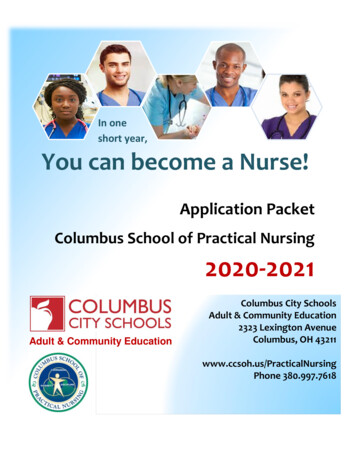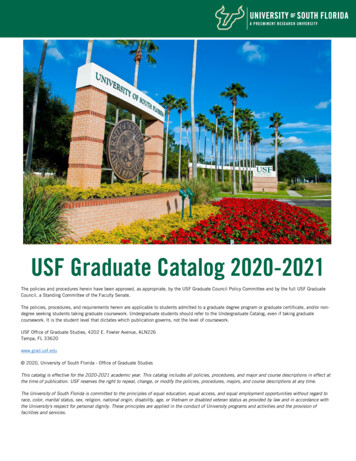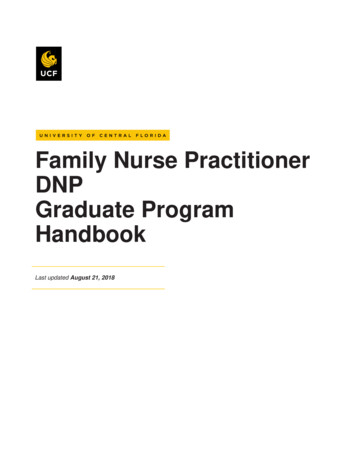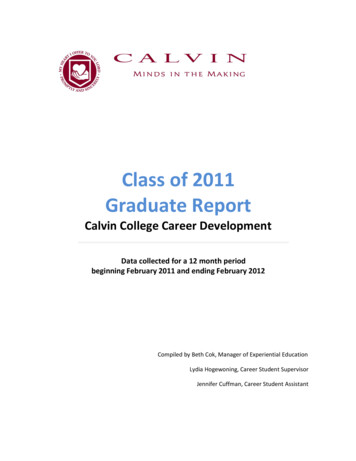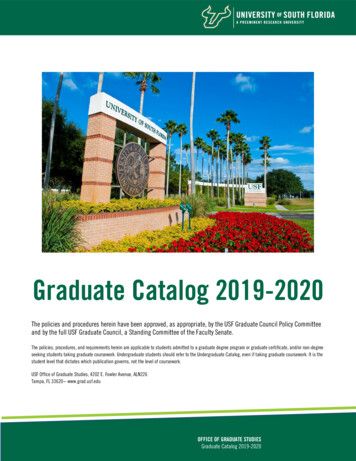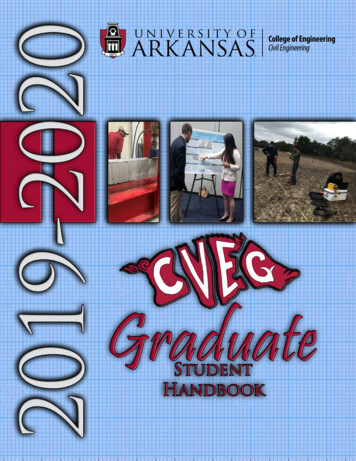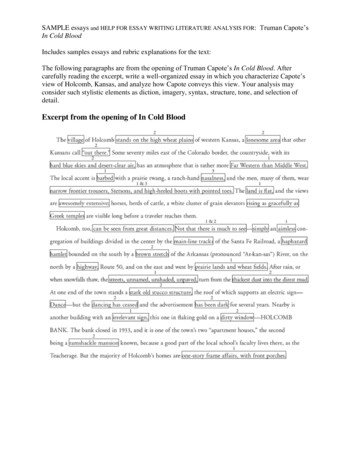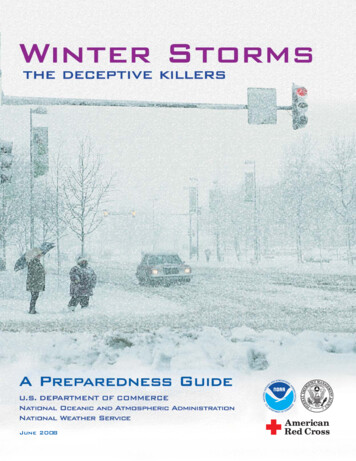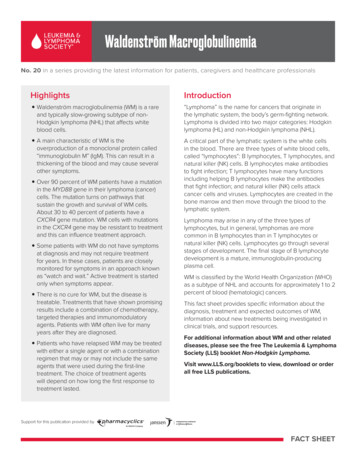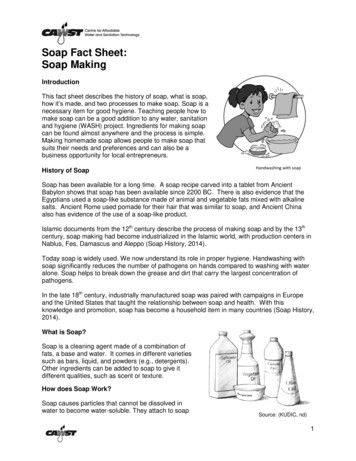
Transcription
Cold Spring Harbor Laboratory l School of Biological SciencesGraduate Program 2020-2021Student Guide & RegulationsCold Spring Harbor Laboratory reserves the right to change, amend or modify the School of BiologicalSciences student policies and procedures to the maxim amount allowed under the lawAlexander Gann, Ph.D., DeanMonn Monn Myat, Ph.D., Associate DeanAlyson Kass-Eisler, Ph.D., Director of Academic Programs and RegistrarKimberly Creteur, M.Ed., M.S.Ed., Admissions & Recruitment ManagerKimberley Graham, Administrative AssistantStudent Guide 2020-2021Page 1
Cold Spring Harbor Laboratory l School of Biological SciencesTABLE OF CONTENTS123456Page561.11.21.31.41.51.6Mission gMatriculationRegistration of Continuing StudentsTransfer of Credit2.12.22.32.42.52.62.7The First YearTutoringFall Course TermLaboratory RotationsTeaching ExperienceDoctoral ResearchPh.D. Qualifying ExamThe Summer Months3.13.23.33.43.53.5.13.5.23.5.33.5.4Fall 2020 CoursesScientific Reasoning and LogicScientific Exposition and EthicsResearch TopicsBootcampsSpecialized Disciplines in BiologyGeneticsCancer BiologySystems NeuroscienceQuantitative l Courses, Symposia, Seminars, and LecturesPost-Fall Term Courses, Meetings, and SymposiaTopics in BiologyCSHL Postgraduate CoursesCSHL MeetingsIn-House SymposiumSeminarsGraduate Student SymposiumIn-House SeminarsCSHL In-House SeminarsCSHL Invited Speakers SeminarsGavin Borden LectureResponsible Conduct of Research and Rigor and ReproducibilityCareer Development esearch Proposal, Thesis Committee, and Doctoral DissertationDoctoral Thesis Research Proposal and Thesis CommitteeThesis Preparation and DefenseCompletion of StudiesStudent EvaluationEvaluation of Student Performance in the Courses1515-1616161616-176.1Student Guide 2020-20216-777-8888888-99999Page 2
Cold Spring Harbor Laboratory l School of Biological Sciences6.26.36.46.56.66.76.86.9Qualifying ExamThesis Proposal DefenseThesis CommitteeThesis Preparation and DefenseAcademic Good StandingMaster of Science (M.S.) DegreeResearch PublicationsStudent Retention, Graduation and Outcomes17171717-18181818-19197.1Resolution of Student GrievancesFiling a Formal Grievance1919-207.2Ombuds7820Student SupportThesis Research FundsLeave of Absence and Research on a Part-Time esComputing ServicesLibrary and ArchivesCore FacilitiesOffice of Diversity, Equity and InclusionAmenitiesSocial and Recreation .3.111.3.211.3.311.3.411.3.5General InformationHealth and Support ServicesCOVID-19HousingAffinity GroupsCareer Development Program (CDP)Bioscience Enterprise Club (BEC)Women in Science and Engineering (WiSE)Diversity Initiative for the Advancement of STEM (DIAS)International Student Network (INeT)272728282929292929291213Sexual Respect and Title IXAccreditation293098.1Student Guide 2020-2021Page 3
Cold Spring Harbor Laboratory l School of Biological SciencesAppendix MaterialsAppendix I:The Role of an Academic MentorAppendix II:Academic Mentor Pool – Fall 2020Appendix III: Faculty Research InterestsAppendix IV: Fall 2020 Weekly SchedulesAppendix V: CSHL Policies Academic Freedom Equal Employment Opportunity/Nondiscrimination/Anti-Harassment Policy andComplaint Procedure Interim Policy and Procedures for Allegations of Title IX Sexual Harassment Research Fraud and Professional Misconduct Individual Development Plans and Post-Graduate Plans Students’ Bill of Rights Transcript Notation Policy CSHL Whistleblower Policy Student Code of Conduct Standards of Conduct Campus Security Guide COVID-19 Booklet Face Covering GuidelinesStudent Guide 2020-2021Page 4
Cold Spring Harbor Laboratory l School of Biological SciencesMission StatementSince 1890, Cold Spring Harbor Laboratory (CSHL) has been a global leader in research andeducation. The international scientific community at CSHL provides a unique and stimulatingatmosphere for doctoral research—an environment where students, postdoctoral fellows, andfaculty work side-by-side. The School of Biological Sciences was founded on the belief that withwell thought-out mechanisms, enthusiastic involvement of faculty, and highly motivated students,an innovative curriculum could be provided that would allow students to earn a doctoral degree ina shorter time than in traditional programs without compromising the quality of their training. Thecurriculum is designed to train students to become scholars and independent thinkers.Our mission is to: Prepare the best and the brightest students to face the ever-changing cutting edge ofbiological and biomedical research with the necessary skills to become leaders in scienceand society. Enable students to complete their PhD in an accelerated timeframe, while maintaining thehighest standards of excellence. Reducing the time to graduation considerably, comparedto the national average. Impart a broad, multi-disciplinary, representation of the biological sciences. Teach students how to think independently and critically focusing on the principles ofscientific reasoning and logic. Educate ethical biologists who can communicate effectively with all audiences. Emphasize that learning is a lifelong process that goes hand-in-hand with outstandingresearch. Facilitate the pursuit of significant, independent thesis research.To accomplish these goals the following unique features drive the program: Separate course work and laboratory rotations into separate phases in the first year oftraining. Extensive student mentoring through a "two-tier" mentoring program. Financial support from the program, which serves to uncouple the funding source fromgraduate education. A student body with diverse ethnicities, nationalities, and educational backgrounds. A unique environment, which includes a world-class scientific Meetings and Coursesprogram, providing the opportunity to meet and learn from leaders in science.Student Guide 2020-2021Page 5
Cold Spring Harbor Laboratory l School of Biological Sciences1.IntroductionSince its inception in 1890, Cold Spring Harbor Laboratory (CSHL) has been involved in highereducation and is today a world leader in biology education. The CSHL Press publishesinternationally recognized books and journals. The Dolan DNA Learning Center educates studentsand teachers about the world of DNA. The Undergraduate Research Program, started in 1959,hosts exceptional undergraduates from around the world for a summer research experience. CSHLis also involved in education at the highest levels through a postgraduate program of 25 advancedcourses in biology, and many large and small international conferences. These meetings andcourses attract 10,000 scientists annually to the Laboratory. The Laboratory has also been involvedin graduate education leading to the Ph.D. degree for over 35 years, particularly through sharedgraduate programs with Stony Brook University.On September 18, 1998, Cold Spring Harbor Laboratory became an accredited degree grantinginstitution for the first time in its history. On that day, the Laboratory received authority from theBoard of Regents of the New York State Education Department to establish the CSHL School ofBiological Sciences and to grant the Ph.D. and M.S. degrees in the biological sciences. Theprogram provides an exciting and intensive educational experience. The course work is variedinvolving core courses, focused topic courses, and CSHL postgraduate courses.The current fields of research expertise of CSHL faculty are: genetics, molecular, cellular, andstructural biology, neuroscience, cancer, plant biology, bioinformatics, genomics and quantitativebiology. The laboratories of all CSHL research faculty are available to students in the program.Requirements for the award of the Ph.D. degree are successful completion of all coursework,laboratory rotations, teaching (at the Lab’s Dolan DNA Learning Center), Ph.D. qualifying exam,thesis research and postdoctoral plans, and defense of a written thesis describing original research.The program aims to train future leaders in science and society.1.1ApplicationApplicants must have received a baccalaureate degree (or equivalent) from an accrediteduniversity or college prior to matriculation. Cold Spring Harbor Laboratory School of BiologicalSciences admits students of any race, color, national or ethnic origin, sexual orientation, disabilityor marital status to all the rights, privileges, programs and activities generally accorded or madeavailable to students at the school. The School does not discriminate on the basis of race, color,national or ethnic origin, sexual orientation, disability or marital status in administration of itseducational and admissions policies, or any school-administered programs. Suitable applicants areassessed on the basis of their academic record, recommendations from their mentors, and an onsite interview. Students must ensure that the school receives all application materials (transcripts,examination scores, letters of recommendation, etc.) no later than December 1 for the followingfall term. Early application is advisable. All applicants must apply online.1.2CurriculumAdvances in biology depend on multidisciplinary approaches, in which knowledge and technologyfrom diverse areas intersect to inspire new discoveries. Today, however, the breadth ofaccumulated knowledge about biology is immense—far more extensive than any individual canassimilate. Thus, the curriculum has been designed to train self-reliant students who, under theirown guidance, can acquire and assimilate the knowledge their research or career demands require.The curriculum takes advantage of the unique and flexible environment of Cold Spring HarborLaboratory and includes the following innovative features: Approximately five years from matriculation to Ph.D. A broad representation of the biological sciencesStudent Guide 2020-2021Page 6
Cold Spring Harbor Laboratory l School of Biological Sciences A first year with course work and laboratory rotations in separate phasesEmphasis on the principles of scientific reasoning and logic as well as the importance ofethics and effective communicationContinued advanced course instruction throughout the graduate curriculumExtensive mentoring and support in large part through our "two-tier" mentoring programA career and skills development course in the third year of the programThe flexible structure of the program permits the design of courses with flexible mandates andformats. Two core courses—Scientific Reasoning and Logic and Scientific Exposition andEthics—span the fall course term and are designed to help students develop the analytical skillsrequired of today’s biologists. The weekly evening research topics seminars give students aninsight into the faculty's current research topics and methods of investigation. The coursesdesignated as Specialized Disciplines in Biology are approximately four weeks long, and allowstudents to explore well-defined research fields in depth. The intensive one-week Topics inBiology courses broaden the educational program by offering instruction in rapidly developingareas of biology. Lastly, the two-to-three-week postgraduate courses offered by the Laboratoryallow students to participate in the lectures offered in a long-standing and highly regarded seriesof advanced-level courses. Thus, a doctoral student participates in a total of 14 lecture courses: thetwo core courses, the research topics, four Specialized Disciplines in Biology courses, four Topicsin Biology courses, and three Cold Spring Harbor Laboratory postgraduate-course lecture seriesas illustrated in the “Curriculum at a Glance” shown opposite.1.3MentoringThe graduate program is committed to the success of its students. To promote a high level ofstudent achievement, the faculty and administration take an active role in mentoring andsupervising the students. A special feature of the curriculum is a "two-tier mentoring" program,which involves an academic and research mentor for each student. Shortly after matriculation,each student chooses a faculty member as an academic mentor. The academic mentor follows thestudent’s academic and research progress, and provides advice for the duration of the student’stenure in the graduate program (see Appendix I on “The Role of an Academic Mentor”). A studentis welcome to suggest a change in academic mentor at any time during their studies. Such a changeshould not be viewed negatively. After the laboratory rotations, each student chooses a researchmentor. The research mentor is the doctoral thesis research advisor, who supervises the student’sindependent laboratory research. Should the student choose his or her academic mentor as theresearch mentor, a new academic mentor is selected. By providing both academic and researchmentors, the School provides each student with advice from faculty who hold different views andcan then offer unique and in-depth evaluations of the student. The mentor pool available to studentsentering in Fall 2020 is detailed in Appendix II.1.4MatriculationAt the time of enrollment, the School administration must have received final official transcriptsfrom the undergraduate institution in which the entering student was enrolled, confirming that theanticipated course of study was completed, and that the appropriate degree was received. Inaddition, New York State Law requires that all college and university students born after January1, 1957, present proof of immunity against measles, mumps, and rubella (MMR). Enrollment inthe Ph.D. program requires documented proof of immunity. New York State only allowsexceptions for medical and religious reasons.All incoming students are required to attend the Ph.D. program orientation, which will take placeAugust 17 to August 19, 2020 (Appendix IV). On joining the program, students are required tocomply with the general requirements of Cold Spring Harbor Laboratory. These include, but areStudent Guide 2020-2021Page 7
Curriculum at a GlanceYEAR 1SEPTDECFall CourseTermPostgradCoursesTopics inBiologyDNALearningCenter1st LabRotation2nd LabRotation3rd salCareer Dev.CoursePostdoctoralProposalThesisDefenseJAN- MAY- SEPTAPR AUG DECYEAR 2JAN- MAY- SEPTAPR AUG DECYEAR 3JAN- MAY- SEPTAPR AUG DECYEAR 4JAN- MAYAPR AUG
Cold Spring Harbor Laboratory l School of Biological Sciencesnot restricted to, health and safety, and security regulations, and policies for a drug free workplace,sexual harassment, equal opportunities, commercial relations, and standards of conduct. Fulldetails of all Laboratory policies will be provided by the Department of Human Resources at thestudent’s “Employee Orientation”. This orientation will take place soon after your arrival at theLaboratory. Copies of Laboratory polices are also available on the internal Web site,http://hr.cshl.edu, under Policies.1.5Registration of Continuing StudentsAll students continuing in the Ph.D. program are required to complete a registration form at thebeginning of the fall term (i.e., during the week beginning August 17, 2020). These forms areavailable from the School office located in the Lindsay Student Center, Urey Building.1.6Transfer of CreditThe CSHL School of Biological Sciences does not accept transfer credits. All students arerequired to complete the School’s curriculum regardless of prior experience.2.The First YearThe first year of the curriculum assumes an innovative format, in which students progress rapidlyfrom course instruction to doctoral research. The year begins with a 15-week fall course term thatextends from the end of August to mid-December. During the fall term, students are free ofresearch responsibilities, which allows them to devote their full attention to intensive courseinstruction and seminars. During the subsequent winter and spring, students participate in threesix-week-long laboratory rotations, a Topics in Biology course, and teaching high school andmiddle school students. In May, students select a research mentor and prepare for the Ph.D.qualifying exam in June. After the requirements of the qualifying exam have been satisfied,students focus on their doctoral research.2.1TutoringThe curriculum is tailored for a highly qualified and diverse student body. Soon after arrival, eachstudent is matched with an academic mentor. Any student needing aid with English or backgroundknowledge in the biological sciences is provided individual tutoring at no cost. Any studentwishing to have an individual tutor should contact the Director of Academic Programs andRegistrar. Students with non-bioscience backgrounds are especially encouraged to consider thisoption. Additionally, teaching assistants for each class are available for individual or groupsessions.2.2Fall Course TermThe curriculum used in the fall course term provides intense instruction in a series of coordinatedand integrated courses. The Curriculum Development and Integration Committee monitors andaids in course development and integration for the Fall Term. Students participate in two corecourses—Scientific Reasoning and Logic, Scientific Exposition and Ethics, and the weeklyresearch topics seminars—which span the length of the fall term. In parallel, students participatein four tandem lecture courses. Students are also introduced to research activities at the Laboratorythrough an annual Laboratory-wide symposium or "retreat" and Laboratory-wide In-Houseseminars. Graduate Student Symposium occurs twice throughout the academic year. An overviewof the weekly schedule follows.2.3Laboratory RotationsAfter the fall course term, students participate in laboratory rotations and attend building-widegroup meetings. These rotations provide students and faculty with opportunities to get to knowStudent Guide 2020-2021Page 8
Cold Spring Harbor Laboratory l School of Biological Scienceseach other and to explore possibilities for doctoral thesis research. At the end of each rotation,students make short presentations of their studies to the other students, their rotation advisors andacademic mentors, and the Scientific Exposition and Ethics core course instructors. These talksgive students an opportunity to share their laboratory experiences and to learn how to give ascientific presentation.2.4Teaching ExperienceAs science plays an increasingly important role in society, there is a need for biologists to educatenonscientists of all ages about biology. The graduate program offers its students unique teachingexperiences through CSHL’s Dolan DNA Learning Center. Graduate students teach laboratorycourses at the DNA Learning Center to high school and middle school students. From theseteaching experiences, graduate students learn how to communicate with non-biologists and toinspire and educate creative young minds. Undergraduate teaching experience is also available aspart of the Career and Skills Development Course.2.5Doctoral ResearchThe most important element of the Ph.D. program is learning to perform independent research thatleads to a unique contribution to human knowledge. Cold Spring Harbor Laboratory is recognizedinternationally for the excellence of its research faculty, and it thus provides an outstandingenvironment for doctoral thesis research. Appendix III provides a summary of the faculty’s currentresearch interests. Following the laboratory rotation schedule, and generally prior to the qualifyingexam, each student selects a research mentor—distinct from the academic mentor—to serve as thedoctoral thesis research advisor.2.6Ph.D. Qualifying ExamIn June of the first year, students in good academic standing take a qualifying exam. Students areexpected to possess a broad basic knowledge of biology and to display the ability to acquire andarticulate in-depth scientific information by defending their knowledge of assigned topics.Students must pass the qualifying exam in order to progress to Ph.D. candidacy.2.7The Summer MonthsUpon progression to Ph.D. candidacy, each student begins full-time doctoral research.3.Fall 2020 Courses3.1Scientific Reasoning and Logic[Instructors: Linda Van Aelst – lead instructor, Alexander Gann, Christopher Hammell, LeemorJoshua-Tor, and Jessica Tollkuhn]A fundamental aspect of earning the Ph.D. is training in the pursuit of knowledge. In this corecourse, which forms the heart of the curriculum, students (1) acquire a broad base of knowledgeabout the biological sciences, (2) learn the scientific method, and (3) learn how to think critically.The beginning of the course is divided into 4-5 modules, each of which has a different generaltheme, and proceeds with the goal of considering an open, still unanswered, scientific question.For each module, students read an assigned set of research articles (generally 4 articles) and at theend of the module, provide written answers to a problem set that guides them through several ofthe articles.Twice weekly students attend lectures related to the module’s topic that include concepts andfundamental information as well as experimental methods. During each week, the students meetamong themselves to discuss the assigned papers not covered by the problem set. Each week,students spend an evening discussing the assigned articles with faculty. In the final part of thecourse, students participate in a mock study-section in which funded National Institutes of HealthStudent Guide 2020-2021Page 9
9:00 AM9:3010:0010:3011:0011:3012:0012:30 7:007:308:008:30Scientific Reasoningand LogicGraduate StudentDiscussion GroupDean's TeaScientific Reasoningand es CourseSpecializedDisciplines CourseThursdaySpecializedDisciplines CourseSpecializedDisciplines CourseWednesdayCSHL SeminarScientific Reasoning andLogicTuesdaySRL Wrap-UpScientific Exposition andEthicsMondaySpecializedDisciplines CourseSci Exp & EthicsCSHL In HouseSeminarScientific Reasoning andLogicFriday
Cold Spring Harbor Laboratory l School of Biological SciencesR01 grants are reviewed and critiqued. This allows the students to evaluate the questions beforethe answers are known, evaluate routes toward discovery before knowing where they will end, andmake critical judgments about how to proceed in the face of an uncertain outcome. The moduletopics for this course are as follows:TopicGene ExpressionGene Regulatory Logic and the Construction of MulticellularOrganisms: Insights from Flies, Plants and WormsThe Brain: wiring, plasticity, and maladaptationMacromolecular Structure and FunctionStudy SectionInstructor(s)GannC. HammellTollkuhnJoshua-TorVan Aelst3.2Scientific Exposition and Ethics[Instructors: David Jackson —lead instructor, Sydney Gary, Rebecca Leshan, Jason Sheltzer]This core course offers instruction in the fundamental elements of scientific exposition—writingskills and public speaking—and ethics. The ability to communicate effectively and to appreciatethe intricacies of ethical issues are essential skills for biologists; both subjects are taught in a seriesof example-based lectures and discussion groups. Writing skills include the fundamentals ofmodern scientific English and the organization and preparation of papers, research abstracts, andgrant applications. Oral presentation skills are taught by instructors with different modes ofpresentation. Together with instructors, students critique formal seminar presentations at theLaboratory. Instruction and discussions about ethics include the ethical implications of biologicaldiscovery on society as well as the nature and boundaries of ethical behavior of scientists and theirrights and responsibilities. A primary objective of the course is that students consider expositionand ethics an integral part of scientific research.3.3Research Topics[Organizers: Kimberley Graham and Alyson Kass-Eisler]As an in-depth introduction to the fields of research that Laboratory scientists investigate, studentsattend a weekly evening Research Topics seminar, at which faculty members describe their currentresearch topics, methods of investigation and mentoring style. Here, the students learn how toapproach important problems in biology. These seminars, together with the annual fall In-Housesymposium, provide students with a basis for selecting laboratories for rotations.3.4BootcampsBootcamps are intensive non-credit short courses aimed at getting all students to a similar level ofproficiency in a defined topic in preparation for the core courses. In the Fall Term 2020, twobootcamps are offered: Techniques in Molecular and Cell Biology, and Quantitative Biology inthe first and second weeks of instruction, respectively. Both bootcamps are required for allstudents, regardless of academic background.3.5Specialized Disciplines in BiologyThe Specialized Disciplines in Biology courses provide in-depth instruction by Cold SpringHarbor Laboratory faculty on defined topics. The courses enable students to identify key issues inthe field, to propose experimental or theoretical solutions to those issues, and to evaluate thepublished literature. The courses demonstrate biological principles that resonate beyond the limitsof the course topics themselves. The Fall 2020 offerings are as follows:Student Guide 2020-2021Page 10
Cold Spring Harbor Laboratory l School of Biological Sciences3.5.1 Genetics and Genomics[Instructor: Ullas Pedmale – lead instructor]In the past, "gene discovery" and association between gene and phenotype were accomplished inmodel organisms. Our understanding of human disease then was advanced by identification ofhuman orthologs associated with disease and by interventionist experiments using animal modelsof human disease. The completion of the human genome sequence, the characterization of thetranscriptional outputs of the genome and the remarkable advances in molecular biologicaltechniques have initiated a paradigm shift in genetics. Associations between gene variants anddisease now can be directly identified and gene-to-phenotype functional associations can thus bediscovered in humans, as well as in model organisms. Causal mechanistic relationships betweengene and phenotype then can be established using interventionist genetic experiments in animalmodels. This permits both a "vertical integration" to understand how molecular mechanismsinfluence functional output across various levels of biological organization and a "horizontalintegration" to understand how genetic pathways have been conserved evolutionarily.This course places modern human genetics and genomics into the context of classical organismalgenetics. History, perspective and technique will be described around four levels of analysis:naturally occurring variation, association studies, genome evolution and genetic screens. How dogene mutations help to define biological processes? How are more complex traits geneticallydissected into simpler (underlying) components and gene-to-gene relationships? What conceptsand techniques are used to organize genes into pathways and networks? How are genes mapped,cloned and engineered to identify functional domains of proteins? What gene variation exists innatural populations? What are the functional consequences of gene variation? How is it detected?How are genomes organized and coordinately regulated? How can genomic information becatalogued, organized and mined? These questions and concepts will be fleshed out usingexamples from the literature.3.5.2 Cancer Biology[Instructors: Mikala Egeblad, Chris Vakoc — co-lead instructors]Cancer represents an increasing cause of morbidity and mortality throughout the world as healthadvances continue to extend the life spans of our populations. Although our basic understandingof cancer has increased considerably since 1971, when United States President Richard Nixoninitiated the 'War on Cancer', our ability to translate this knowledge into a health benefit forpatients has been restricted to certain malignancies and often only temporarily. Importantly,specific hypotheses developed from our knowledge of cancer biology can be tested in increasinglycomplex model systems ranging from cell culture to genetically engineered mouse models, andsuch investigations should prove invaluable in discovering new methodologies for the detection,management and treatment of cancer in humans.At the conclusion of this course, you should be able to elaborate an understanding of cancer as apathobiological process that invades our bodies without offering any known benefit to the host;discuss how we diagnose cancer today; and contemplate how to replace the methods currently usedto treat cancer. You will also be able to design tractable methods to investigate fundamental aspectsof cancer biology, and will be familiar with translational approaches to defeating cancer. Topicscovered in this course will include biochemistry, epigenetics, immunology, resistance, growthcontrol, microenvironment non-coding RNA, and disease modeling. The implications of thebiological findings on cancer prevention, diagnosis, and treatment will be covered.3.5.3 Systems Neuroscience[Instructors: Stephen Shea — lead instructor, Florin Albeanu]This course will introduce students to neuroscience, with a focus on learning and plasticity fromits cellular basis, through development, to systems and behavior. Both experimental andStudent Guide 2020-2021Page 11
Cold Spring Harbor Laboratory l School of Biological Sciencestheoretical viewpoints will be explored. The course will start with the basics of electrical signalingin neurons: ion channels, action potentials, and synaptic transmission. The cellular basis oflearning including Hebb’s postulates, LTP (long-te
3.5 Specialized Disciplines in Biology 10-12 3.5.1 Genetics 11 3.5.2 Cancer Biology 11 3.5.3 Systems Neuroscience 11-12 3.5.4 Quantitative Biology 12 . The School of Biological Sciences was founded on the belief that with well thought-out mechanisms, enthusiastic involvement of faculty, and highly motivated students, .
